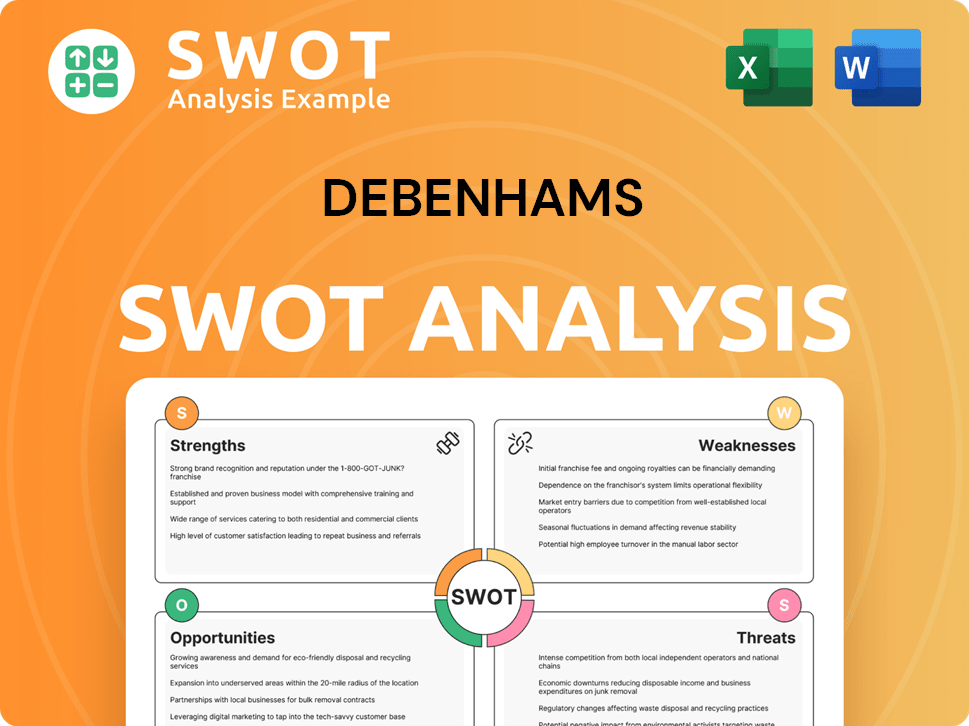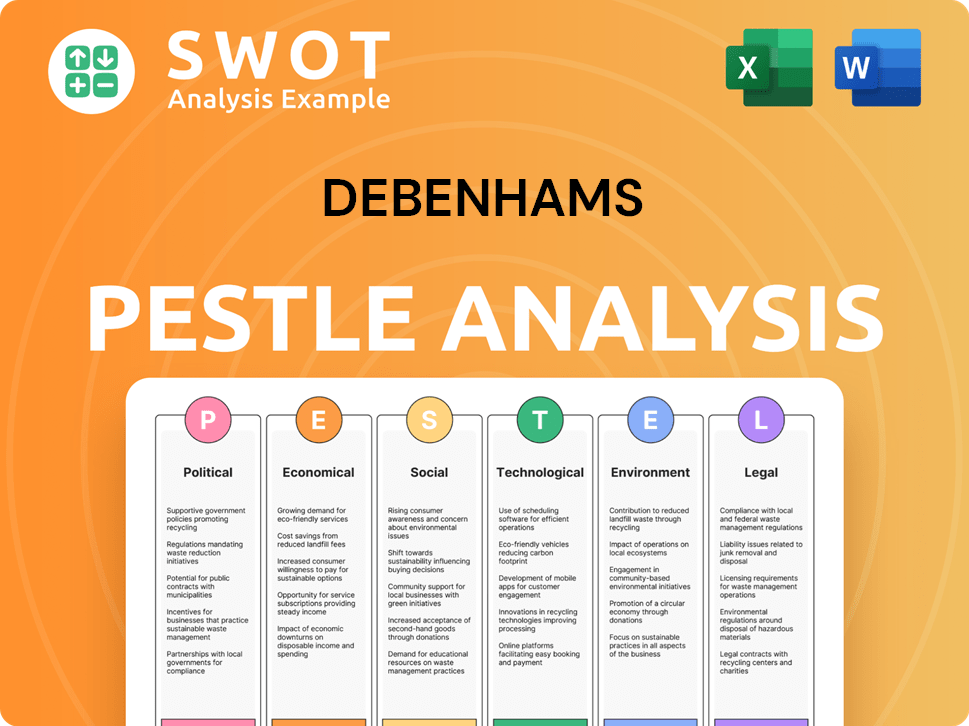Debenhams Bundle
Who Really Owns Debenhams Now?
Understanding the Debenhams SWOT Analysis is crucial, but have you ever wondered who pulls the strings behind a retail giant? The story of Debenhams, a British institution, is a fascinating tale of transformation, from its humble beginnings in 1778 to its current digital-first strategy. Exploring the shifting sands of Debenhams ownership reveals a lot about modern retail.

The Debenhams acquisition by Boohoo Group in 2021 marked a pivotal moment, signaling a dramatic shift in the brand's identity and operational model. This change underscores the importance of understanding the Debenhams owner, as it directly impacts the company's future. Delving into the Debenhams history and its ownership structure provides crucial insights into the brand's resilience and adaptation in a dynamic market. Examining the Debenhams parent company offers a comprehensive view of this iconic brand.
Who Founded Debenhams?
The story of Debenhams begins in 1778 with William Clark's drapery shop at 44 Wigmore Street, London. The initial ownership was vested in Clark himself, marking the start of what would become a retail giant. Understanding the evolution of Debenhams ownership is key to tracing its journey through the retail landscape.
A significant shift occurred in 1813 when William Debenham joined the venture, leading to the renaming of the business as Clark & Debenham. While specific equity details from this early period are not readily available, Debenham's investment was a pivotal moment. This change set the stage for future expansions and alterations in the company's ownership structure.
Over time, the ownership structure of Debenhams evolved through partnerships. Clement Freebody's addition in 1819 and the subsequent inclusion of other partners, such as Pooley and Smith, shaped the company. By 1870, the company was known as Debenham & Freebody, reflecting the continuous adaptation of its partnership framework. These shifts in ownership and partnerships were crucial for Debenhams' growth.
William Clark founded the business in 1778. The initial ownership was solely with Clark.
William Debenham invested in 1813. The company was renamed Clark & Debenham.
Clement Freebody joined in 1819. The company evolved to include Debenham, Pooley & Smith and later Debenham & Freebody.
Partnerships helped pool capital. This enabled expansion and a stronger market presence.
The renaming of the firm indicates shifts in ownership. This shows operational control among partners.
The founders expanded from drapery to a department store. This laid the foundation for future growth.
The early history of Debenhams reveals a dynamic evolution in Debenhams ownership. From its founding by William Clark to the inclusion of William Debenham and subsequent partners, the structure adapted to support growth. Understanding these shifts provides insights into the company's strategic development and its ability to navigate the competitive retail environment. The early partnerships were instrumental in shaping the company's trajectory.
- William Clark established the business in 1778.
- William Debenham's investment in 1813 was a significant turning point.
- Partnerships with Freebody and others were crucial for expansion.
- The company's evolution reflects strategic shifts in ownership and control.
Debenhams SWOT Analysis
- Complete SWOT Breakdown
- Fully Customizable
- Editable in Excel & Word
- Professional Formatting
- Investor-Ready Format

How Has Debenhams’s Ownership Changed Over Time?
The journey of Debenhams ownership is a story of transitions, from public trading to private equity control and back, culminating in its acquisition by Boohoo Group. Initially, Debenhams was a publicly listed company on the London Stock Exchange, with shares held by various institutional and individual investors. This structure changed in 2003 when a private equity consortium acquired the company for £1.7 billion, taking it private and significantly increasing its debt load. This shift set the stage for future financial challenges.
Debenhams returned to the stock market in 2006, but the debt burden from its private equity phase persisted. Over the years, major shareholders included institutional investors and, notably, Sports Direct, led by Mike Ashley, who attempted to gain control. The company's financial struggles led to administration in April 2019, transferring ownership to a lender consortium. The final chapter saw Boohoo Group acquire the Debenhams brand and website in January 2021 for £55 million, transforming it into an online-only business. Today, Boohoo Group Plc (LSE: BOO) owns Debenhams, with shares traded publicly, and the ownership structure is primarily composed of institutional investors.
| Timeline Event | Ownership Change | Key Stakeholders |
|---|---|---|
| Pre-2003 | Publicly Listed | Institutional Investors, Individual Shareholders |
| 2003 | Private Equity Acquisition | CVC Capital Partners, Texas Pacific Group, Merrill Lynch Private Equity |
| 2006 | IPO, Publicly Listed | Institutional Investors |
| 2019 | Administration, Lender Takeover | Silver Point Capital, GoldenTree Asset Management, Sports Direct |
| 2021 | Acquisition by Boohoo Group | Boohoo Group Plc (LSE: BOO) |
The evolution of Debenhams ownership reveals the impact of financial strategies and market dynamics. The shift from public to private equity and back highlights the influence of debt and shareholder interests. The acquisition by Boohoo Group marks a significant change in the company's business model and ownership structure. For more insights, explore the Revenue Streams & Business Model of Debenhams.
Debenhams' ownership history is marked by significant changes, including private equity involvement and a shift to online retail.
- Initially, it was publicly traded on the London Stock Exchange.
- Private equity firms acquired Debenhams in 2003.
- In 2019, the company went into administration.
- Boohoo Group acquired the brand in 2021.
Debenhams PESTLE Analysis
- Covers All 6 PESTLE Categories
- No Research Needed – Save Hours of Work
- Built by Experts, Trusted by Consultants
- Instant Download, Ready to Use
- 100% Editable, Fully Customizable

Who Sits on Debenhams’s Board?
The current Debenhams ownership structure places the brand under Boohoo Group Plc. Consequently, the board of directors and voting power are now determined by Boohoo Group's governance. The Boohoo Group board is responsible for the strategic direction of all its brands, including Debenhams. This shift reflects the Debenhams acquisition by Boohoo, which has integrated the department store's operations into its broader business model.
The Boohoo Group's board includes executive directors like John Lyttle (CEO) and Shaun McCabe (CFO), alongside non-executive directors. These individuals oversee the strategic direction of the group, including Debenhams. Major shareholders, primarily institutional investors, exercise their voting power through their shareholdings. Boohoo Group operates on a one-share-one-vote system for its ordinary shares. This structure ensures that voting power is directly proportional to the number of shares held, influencing the election of the board and major corporate decisions. For more insights, consider reading about the Growth Strategy of Debenhams.
| Board Member | Position | Notes |
|---|---|---|
| John Lyttle | CEO | Oversees the strategic direction and operational performance of the group. |
| Shaun McCabe | CFO | Responsible for financial strategy, reporting, and control. |
| Carol Kane | Co-founder and Executive Director | Provides strategic input and guidance based on her extensive experience. |
Historically, before the acquisition, Debenhams had its own board, which included executive and non-executive directors, and representatives of major shareholders. During periods of private equity ownership or when activist investors held significant stakes, the board's composition and strategic decisions were subject to influence. Proxy battles and campaigns by activist investors aimed to change leadership and financial restructuring. However, with the integration into Boohoo, the voting power now resides with Boohoo Group shareholders.
Boohoo Group Plc currently owns Debenhams, making them the Debenhams parent company.
- Boohoo Group's board of directors oversees Debenhams.
- Voting power resides with Boohoo Group shareholders.
- Debenhams owner is now Boohoo Group, integrating Debenhams operations.
- The Debenhams history includes a transition from an independent entity to part of a larger group.
Debenhams Business Model Canvas
- Complete 9-Block Business Model Canvas
- Effortlessly Communicate Your Business Strategy
- Investor-Ready BMC Format
- 100% Editable and Customizable
- Clear and Structured Layout

What Recent Changes Have Shaped Debenhams’s Ownership Landscape?
The most significant shift in Debenhams ownership in the last few years has been its transition from a traditional high-street retailer to an online-only brand. This transformation culminated in January 2021 when Boohoo Group Plc acquired the Debenhams brand and its website for £55 million. This acquisition followed the liquidation of Debenhams' physical stores, marking a complete change in its operational model and ownership structure.
Since the Debenhams acquisition, Boohoo Group has focused on expanding its online marketplace. This strategy aligns with the broader trend of digital transformation in retail, accelerated by the COVID-19 pandemic, which significantly increased e-commerce spending. The Debenhams owner is now Boohoo Group, a publicly traded company, and its future is closely tied to the parent company's performance and strategic decisions.
From an ownership perspective, Debenhams is now a wholly-owned subsidiary of Boohoo Group. The parent company's financial health and strategic direction directly influence Debenhams' future. As of 2024, Boohoo Group continues to evaluate its brand portfolio. The retail sector's trend involves acquisitions by online retailers or larger groups, aiming to consolidate market share and leverage established brand names in the digital space. This mirrors Debenhams' journey, evolving from diverse public shareholders to a focused online retail group.
| Aspect | Details | Impact |
|---|---|---|
| Acquisition Date | January 2021 | Transition to online-only model |
| Acquisition Price | £55 million | Significant change in Debenhams' valuation |
| Current Owner | Boohoo Group Plc | Future tied to parent company's performance |
Debenhams is now owned by Boohoo Group Plc. This shift happened in January 2021. The focus is on expanding its online presence.
Boohoo Group aims to leverage the Debenhams brand for its online marketplace. This aligns with the broader trend of digital retail transformation. The parent company evaluates its brand portfolio.
The acquisition price was £55 million. The financial performance of Boohoo Group directly affects Debenhams. Investor sentiment influences the share price.
The retail sector sees acquisitions by online players. Heritage brands are often consolidated in the digital space. This reflects Debenhams' shift in ownership.
Debenhams Porter's Five Forces Analysis
- Covers All 5 Competitive Forces in Detail
- Structured for Consultants, Students, and Founders
- 100% Editable in Microsoft Word & Excel
- Instant Digital Download – Use Immediately
- Compatible with Mac & PC – Fully Unlocked

Related Blogs
- What are Mission Vision & Core Values of Debenhams Company?
- What is Competitive Landscape of Debenhams Company?
- What is Growth Strategy and Future Prospects of Debenhams Company?
- How Does Debenhams Company Work?
- What is Sales and Marketing Strategy of Debenhams Company?
- What is Brief History of Debenhams Company?
- What is Customer Demographics and Target Market of Debenhams Company?
Disclaimer
All information, articles, and product details provided on this website are for general informational and educational purposes only. We do not claim any ownership over, nor do we intend to infringe upon, any trademarks, copyrights, logos, brand names, or other intellectual property mentioned or depicted on this site. Such intellectual property remains the property of its respective owners, and any references here are made solely for identification or informational purposes, without implying any affiliation, endorsement, or partnership.
We make no representations or warranties, express or implied, regarding the accuracy, completeness, or suitability of any content or products presented. Nothing on this website should be construed as legal, tax, investment, financial, medical, or other professional advice. In addition, no part of this site—including articles or product references—constitutes a solicitation, recommendation, endorsement, advertisement, or offer to buy or sell any securities, franchises, or other financial instruments, particularly in jurisdictions where such activity would be unlawful.
All content is of a general nature and may not address the specific circumstances of any individual or entity. It is not a substitute for professional advice or services. Any actions you take based on the information provided here are strictly at your own risk. You accept full responsibility for any decisions or outcomes arising from your use of this website and agree to release us from any liability in connection with your use of, or reliance upon, the content or products found herein.